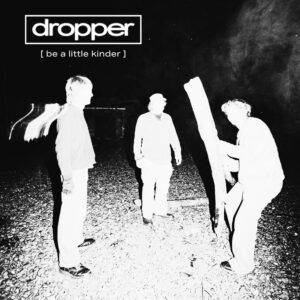Introducing: Shakey Graves (Interview)
 It seems Austin, Texas is teeming with musical talent. The latest to emerge from the self-proclaimed “Live Music Capital Of The World” is a gentleman named Alejandro Rose-Garcia…or as he’s known on record…Shakey Graves. Shakey, or “Al”, as his friends call him, stirred up a little buzz when he released his debut album in 2011. That one was a one-man-band affair, with Shakey pounding on an old Samsonite suitcase for percussion. His new album, And The War Came, is a bit more sophisticated and features several duets with vocalist Esme Patterson. With a show scheduled at Auckland’s Tuning Fork in late February, it seemed only right and just that The 13th Floor’s Marty Duda should give Shakey Graves a call and find out what’s on his mind.
It seems Austin, Texas is teeming with musical talent. The latest to emerge from the self-proclaimed “Live Music Capital Of The World” is a gentleman named Alejandro Rose-Garcia…or as he’s known on record…Shakey Graves. Shakey, or “Al”, as his friends call him, stirred up a little buzz when he released his debut album in 2011. That one was a one-man-band affair, with Shakey pounding on an old Samsonite suitcase for percussion. His new album, And The War Came, is a bit more sophisticated and features several duets with vocalist Esme Patterson. With a show scheduled at Auckland’s Tuning Fork in late February, it seemed only right and just that The 13th Floor’s Marty Duda should give Shakey Graves a call and find out what’s on his mind.
Click here to listen to the interview with Shakey Graves:
Or, read a transcription of the interview here:
MD: You’ve been on the road quite a bit this year. I’ve been reading about some of your exploits and one of the things that I wanted to hear about was this Mavis Staples 75th birthday thing that I think you participated in and it sounds pretty exciting.
SG: Oh yeah. Well yeah, I mean, it was, well it coincided with, was at Newport Folk Festival, you know, which was also a huge deal, I never really considered the fact that I would play at the Newport Folk Festival.
MD: Right.
SG: And then, you know, it was even more surreal because essentially what they do for the last show, the Newport Folk Festival, they have all the bands come out and they do a big group version of We Shall Overcome.
MD: Right.
SG: And this last year was actually the first year Pete Seeger hasn’t been there because he passed away.
MD: Right.
SG: So, you know, up until this year Pete would come out and lead, We Shall Overcome and he couldn’t really sing anymore because he’s lost his voice to throat cancer or something along those lines. So he would, he’d be like these are the words, you know, and people go ‘these are the words’ so you see there was nobody to lead anybody through We Shall Overcome and Mavis knew all the words but I was out there with like Lucius and all the people that were playing at the festival kind of the young, you know, the young bucks or whatever, so to speak.
MD: Right.
SG: And it was one of those great moments where none of us knew all of the words to We Shall Overcome, it was like wow, you know, this is Mavis’s birthday, watch her blow out her cake and it just was a very surreal life moment where it’s like wow, this is a strangely momentous moment, you know,
MD: That’s pretty cool, yeah, and I think you’ve also played a festival with a band called Unknown Mortal Orchestra who is a New Zealand band, who’s now based in The States.
SG: Absolutely, yeah, I am a huge UMO fan. Got to play with, at a place called Pickathon and yeah, that was a real treat and I love the music that they create. Watching them play live was something I had been waiting for, for a while.
 MD: Now I know you’re from Austin Texas, I’ve been there a couple of times, it’s an amazing place and I’m just wondering if you can give me a little background about yourself as far as, you know, when you were growing up in Austin and what kind of music you ran into and what got you involved in becoming a musician, a song writer?
MD: Now I know you’re from Austin Texas, I’ve been there a couple of times, it’s an amazing place and I’m just wondering if you can give me a little background about yourself as far as, you know, when you were growing up in Austin and what kind of music you ran into and what got you involved in becoming a musician, a song writer?
SG: I mean I got involved kind of for my own personal reasons. It was really a lot to do with the first girl that I ever dated which was in middle school. I had a, you know, a cool 8th grade girlfriend and I was in 7th grade, it was a huge deal.
MD: That is pretty big, yeah.
SG: I had this older woman, you know, it was a huge deal. She ended up going to Mexico for the summer and I found out through her best friend that she had like cheated on me while she was in Mexico which I don’t even really know what that entailed.
MD: Right.
SG: But it, you know, blew my mind. I had no frame of reference for that sort of emotion, I had never, you know, no, nothing, no template.
MD: Right.
SG: And she had a huge thing for guitar players, like a really crazy like ‘oh they play guitar, I don’t care I’m crazy about it’ and so I had this, you know, master plan to like be really good at guitar and be really muscly and, you know, when she came back be like ‘oh hey, didn’t even see you there, too busy wailing on this guitar and being, you know, really buff and stuff’ and all of that just totally just went out the window, you know, when she came back, It was like she didn’t care, I didn’t care but during that period, you know, I’d found, I put everything that I had, all this weird unfounded emotions directly into the guitar.
MD: Right.
SG: And then, you know, it stuck and I eventually probably within the next year, year and a half I started trying to compose music and working with mult-itracking, you know, like started putting it to work immediately.
MD: Right and what kind of music were you listening to that was kind of influencing what you were doing? Was it the typical kind of Austin thing, you know, Blues and Country and Folk and that kind of thing?
SG: Well I mean all that stuff was kind of around in the environment, you know, it’s like, you know, if your family is ranchers or something, you’re gonna be around a lot of cows but I’m not sure if that was my initial passion, you know, took me a long time to come back around to more roots music.
MD: Right.
SG: I was listening to singer/ song writer stuff and Indie Rock and things on the radio. You know, nothing special per say, I wasn’t a wizard or anything like that.
MD: Right.
SG: And there was always a good foundation of stuff that I didn’t even appreciate at the time, like Bruce Springsteen or Neil Young and the Talking Heads and stuff like that. Then later, you know, become a slow renaissance of that stuff and I’m really happy that those influences were floating around there in the background no matter what.
MD: Right. Now you have a song on your latest album that’s just about to be released down here. I know it’s been out in The States for a while, called Big Time Nashville Star and…
SG: Oh yeah.
MD: I was wondering if you could kind of explain what the, there’s definitely a different head space between the music scene in Austin and in Nashville. Maybe, I don’t know how much experience you have of the Nashville scene, but maybe you could kind of explain it for folks down in New Zealand here.
SG: Yeah, sure. I mean, you know, what that song really is about is, you know, it’s less about the reality of Nashville and it’s more about kind of the idea of it, you know, Nashville is in a place, it’s essentially just like Hollywood but for music, you know?
MD: Right.
SG: Especially in the 70s and stuff, if you wanted to have a record put out and you were involved in roots music or plain Folk or any of that, you know, that was the destination, you wanted to go to Nashville and try and hit it big, you know. So the confidence behind that song is that very thing, like you can go and try and hit it as big as you want or you know, you can go and try and dig up a pot of gold somewhere but its still, you know, it won’t bother me like go for it, you know, you can’t, it’s kind of a you can’t hurt me anymore song.
MD: Yeah and I know that one of your songs has been used on the TV show in Nashville which airs down here.
SG: Oh yeah.
MD: Since you’ve done some acting, has there been any talk of you appearing on the show itself? It seems like a natural thing.
SG: Oh god. I don’t know. No, not that I’ve heard of. That would be amazing but, no, so far, you know, I’m the man behind the curtain right now, which is nice.
 MD: Gotcha. The song is kind of a duet between you and Esme Patterson, another vocalist who we probably aren’t that familiar with down here. Maybe you can tell us a little bit about her and why it is that you and her choose to sing together?
MD: Gotcha. The song is kind of a duet between you and Esme Patterson, another vocalist who we probably aren’t that familiar with down here. Maybe you can tell us a little bit about her and why it is that you and her choose to sing together?
SG: We met while we were both on tour in separate bands for a third band and we wrote Dearly Departed together, that was our first song we were worked on together, kind of a joke, it was really easy to write down, you know.
MD: Right.
SG: When we did that, like wow that worked out well, maybe we should do that again and then we did. Essentially it was just kind of an initial sort of shocking ease between the ways that we perceived music to be written and it became very symbiotic, obvious we should write music for a while. So we wrote, you know, three songs that appear on that record and she came down to Texas and helped us do all the tracking, record and then the rest is, you know, the rest is history.
Click here to listen to Dearly Departed featuring Esme Patterson from And The War Came:
MD: Right, right. Also I think you have a fairly close musical relationship with another act called Shovels and Rope who are also going to be coming down this neck of the woods.
SG: Yeah.
MD: At some point. Maybe you can tell me what that’s all about.
SG: Well they, you know, they’re one of my favourite bands that works right now. I think they’re some of the best musicians that I’ve seen in my lifetime, you know, not to get too grand about it.
MD: Right.
SG: So they were also one of the first bands that ever took me out on tour as direct support for them. So, you know, I consider them mentors in a lot of ways and I really, you know, I keep a close eye on them and I just, you know, they mean the world to me, not only as musicians but also as people. So they really helped me educate myself about how important it is to, you know, stay true to what you do and keep your feet on the floor even though you might be, you know, floating towards the ceiling.
MD: Right.
SG: And again yeah, we get to go down to Australia and New Zealand with them, I don’t think we’re coming to New Zealand at the same time but we’re doing a bunch of dates together in Australia during that trip out there.
MD: Okay.
SG: So that’s a treat for me as a fan and also as a friend. I’m really excited to go to a totally, you know, foreign country with the people that I couldn’t be happier to be by their side.
MD: Cool. Now I wanted to talk a little bit more about the new album, And The War Came. It’s your second album and there’s always a lot of discussion about, you know, the difficult second album and the kind of perceived theory is you have a lifetime to write all these songs for the first one and then your second one, you know, fairly quick coming up and you got to come up with.. But I think I read something where you mentioned that a lot of the problem with the pressure of a second album is the fact that, you know, the first album kind of raises expectations and now you have to kind of live up those expectations on the second album. Is that kind of what you were thinking of when you were making the record?
SG: No I kind of, that was sort of a main thing that I didn’t want to focus on. I really want, it felt like it was important for me to make the kind of album that I wanted to make.
MD: Right.
SG: And also, you know, the first album, I didn’t put out to anybody, I didn’t even have audience when I put it out. So the most challenging thing was making sure that I wasn’t alienating anybody.
MD: Right.
SG: And also I wasn’t worrying about what people thought about it because in the long run, you know, if I stuck by that train of logic, I don’t think I would have even be able to make the first album because I would have been weeping and moaning over every sonic choice that I made.
MD: Right.
SG: Which was sort of a, you know, a testament to just being brave in a certain sense and I’m sure that this album had thrown some people off or, you know, this and that but it’s also brought a lot of people on that wouldn’t have found my music otherwise and, you know, just because the last album didn’t sound like this album doesn’t mean that this album is gonna sound anything like the next album.
MD: Right.
SG: That’s sort of the one thing that’s gonna be constant in what I do, you know, I’m gonna grow. So if you trust me just come along.
MD: Gotcha. I also read, I think you mention that the album is kind of about becoming domesticated in some form or fashion. Maybe you can elaborate on that a little bit.
SG: Sure. Yeah I mean it’s the idea the first album was kind of about running away from everything and this album was about that choice that you make where you’re like I wanna be responsible for whatever, you know, for love or for friendship or through your family or being your age or like maybe I should get a job or, you know, any of that stuff. The first album really reflected the fact that it was me all alone making it and this album definitely, even in the narrative of it, is a about the that comes with having other people be In your life and the weight of love, you know, all that stuff.
MD: Gotcha. One of the tracks that kind of grabbed my attention when I first listened to it was Family and Genus, it has this beautiful string section and then, you know, it’s very intimate sounding and then you have this kind of weird recorded phone conversation between a couple of females at the end. What was going on there?
SG: Well that was actually a found audio thing that my drummer and producer and, you know, and musical counterpart Chris Boosahda had bought an old 1950s tape recorder off of eBay.
MD: Right.
SG: It was like a reel to reel tape recorder and it had this recording that these two girls had made probably at some point in the 50s where they were like telling dirty jokes and, you know, they’re just being girls and, you know, the refreshing part about it is that it’s the sentiment of what they’re talking about could just as easily been recorded today, you know, the setting’s different but the mind-set is always kind of the same as people. That was where I was going with it.
MD: Yeah, I wouldn’t have guessed that it was recorded in the 50s by the way that they were talking. They sounded very contemporary.
SG: Yeah, that’s the thing. It’s like, you know, you always assume that everyone wanted to get married and do, you know, and all this shit. Then, you know, it’s great to hear this girl like do you wanna go to college? She’s like no, so you do you wanna, you know, like no, like what do you look for in boys?, Looks. Great. Their dirty jokes are hilarious, we wanted to put more recordings on there because they got some other ones, cause the dirty jokes don’t make any sense, cause they’re totally dated, the punch lines are like what, what are they talking about, what is this? And they’re just rolling on the floor, they’re just losing it, you know.
MD: Excellent. Now I think I also read somewhere that you may be working on a new EP that could be out by February. Is that something that’s in the pipe line?
SG: Yeah. Well I release something every February 9th which is on a thing called Shakey Graves day, which was…the city of Austin gave me a day in 2012.
MD: Right.
SG: Which was a kind of sweet honorary thing. So I use that as an excuse to have it be a release day every year for me to put out either unreleased material or you know, like for instance maybe I’ll put out some of those dirty jokes or some of the other recordings that those girls have.
MD: Right.
SG: You know, in February so that people can hear it.
MD: Okay. So when you come and perform here at the end of February. Are you solo, are you bringing other musicians with you? What can we expect?
SG: Yeah it will be me and a drummer. It will be a two piece and we get a lot done like that.
Click here for more details about Shakey Graves’ show at The Tuning Fork.
- Greta Van Den Brink – GIMBGTBLBM: 13th Floor New Song Of The Day - 05/12/2025
- Steve Cropper Has Died Age 84: R.I.P. - 04/12/2025
- PRINS – Heaven Or Hell: 13th Floor New Song Of The Day - 04/12/2025
